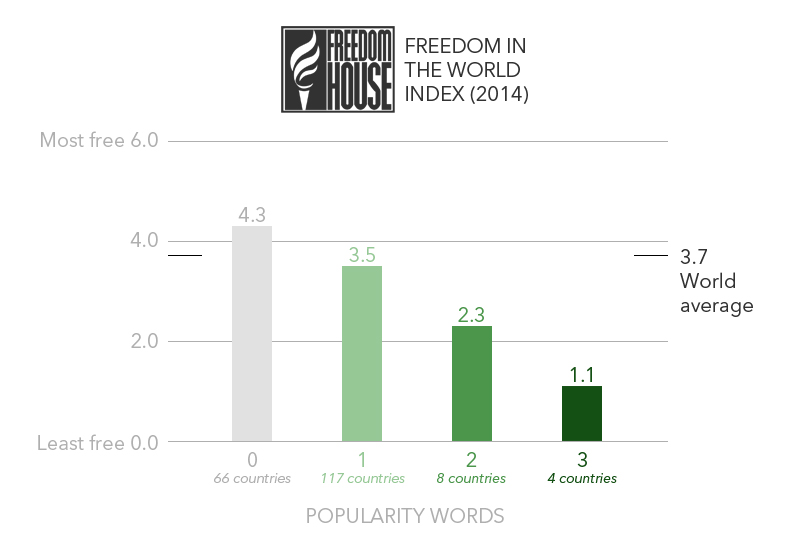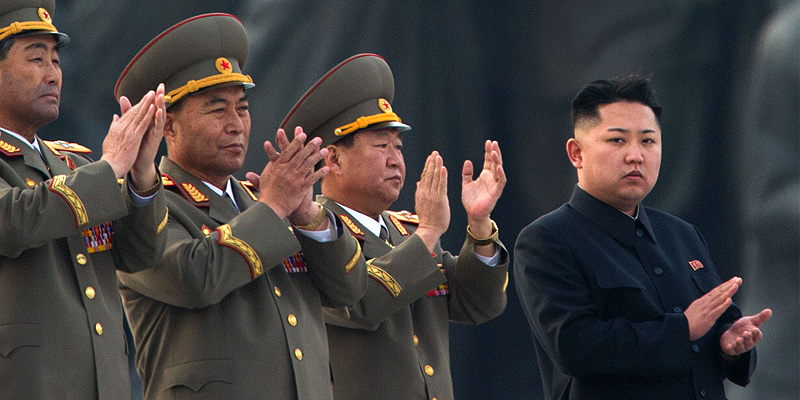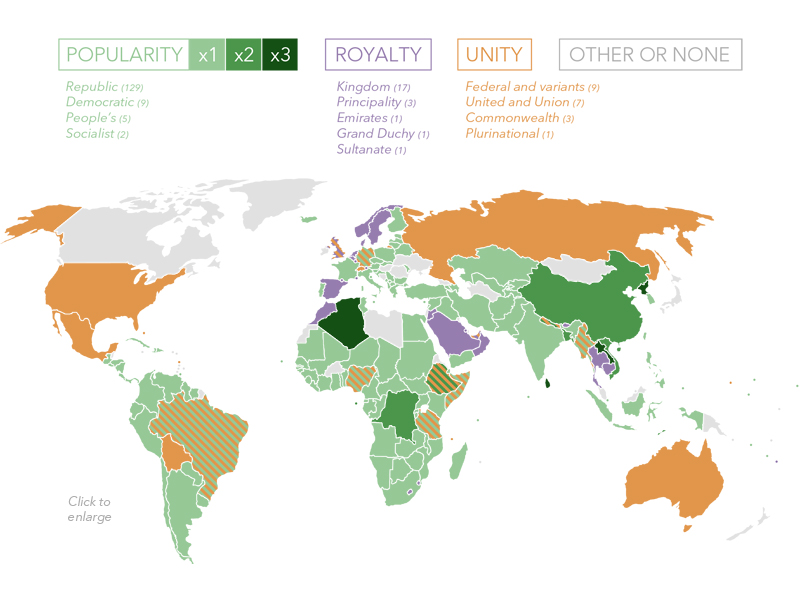When People’s Democratic Republics Are None of the Above
| Adam Tiouririne | Bio | Posts 3 Sep 2014 | 10:20AM |
This analysis was featured in Foreign Policy’s Democracy Lab Weekly Brief on September 8, 2014. Thanks, FP!
In international affairs, some phrases are so consistently misused that they should immediately arouse suspicion: “The talks were productive.” “Our civilian nuclear energy program.” “We cannot confirm or deny.” And here’s another one: “People’s Democratic Republic.”
People’s Democratic Republics are actually the least likely countries to be popular, democratic, or republican.
Let’s start with a look at how countries name themselves. Founding fathers like George Washington, Mohandas Gandhi, and Ho Chi Minh all have something in common with more conventional parents: Arguing over baby names. For example, Macedonia, grown from a baby to a teenager, is embroiled even still in a bitter naming dispute with Greece — which is formally named the Hellenic Republic.
Most countries’ formal names consist of a geographic word (which we usually use as each country’s common name) with one or more types of modifiers:
| Popularity: Words asserting that power belongs to the people. (Republic of France; Democratic Republic of the Congo; People’s Republic of China; Socialist Republic of Viet Nam) |
| Royalty: Words referencing a hereditary ruler. (Kingdom of Saudi Arabia; Grand Duchy of Luxembourg; Sultanate of Oman) |
| Unity: Words implying togetherness or the sum of constituent parts. (Russian Federation; United States of America; Commonwealth of Australia) |
A few countries combine categories (Federal Democratic Republic of Ethiopia), use other modifiers (Independent State of Samoa), or eschew descriptions altogether (Canada). But for all their revolutionary boldness, most national founders have settled on the safe choice: Simply “Republic.”
Just four countries have dared to bedazzle their names with a Popularity trifecta: The People’s Democratic Republic of Algeria; the Lao(s) People’s Democratic Republic; the Democratic People’s Republic of (North) Korea; and the Democratic Socialist Republic of Sri Lanka. But these utopian names belie bleaker conditions on the ground.
There’s an Orwellian trend in national names.
Each year, the NGO Freedom House publishes an international index of political rights and civil liberties — in other words, of how popular, democratic, and republican countries actually are. These rankings show that the more Popularity words a country’s name includes, the fewer political and social freedoms its people tend to have.

George Orwell’s Politcs and the English Language decries imprecision and obfuscation in the political language of his time. And that was 1946. Orwell, who died before any of the three-Popularity-word countries was established, would be shocked at how far doublespeak has come.
What explains this combination of lofty language in official documents and base repression in the streets?
Perhaps the founders who peppered their countries’ names with Popularity words really did intend to conceal the authoritarian flavors they planned. Or perhaps their chosen names are evidence of unattainably good intentions that inevitably went awry.
But the most important factor in these countries’ lack of political and social freedom may be their age. Countries with multiple Popularity words in their names tend to be founded more recently than other countries. That means they’ve had less time to develop open political norms and institutions. In naming their countries, these founders may simply have been victims of a long-term uptrend in Orwellian language — a scourge yet absent when the longstanding Kingdoms and Republics of, say, liberal Europe were born.
Whatever the cause, treat the phrase “People’s Democratic Republic” like you’d treat the phrase “We cannot confirm or deny”: When you hear it, take a closer look.
The United Nations list of formal country names is available here (PDF), and the Freedom House 2014 Freedom in the World report is available here. Note that the Freedom House data in this post has been inverted (so that higher numbers mean more political and social freedom, rather than less) and shifted (from a 1-7 scale to a 0-6 scale) for ease of understanding. All of the original rankings and the differentials between them are fully preserved.
Share your thoughts here, like this post on LinkedIn, or tweet @Tiouririne.




Leave a Reply
Want to join the discussion?Feel free to contribute!